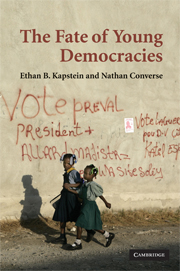Book contents
- Frontmatter
- Contents
- List of Figures and Tables
- Preface and Acknowledgments
- 1 What Makes Young Democracies Different?
- 2 Why Do Young Democracies Fail?
- 3 Are Some Regions More Democracy Friendly?
- 4 Is Democracy Promotion Effective?
- 5 Conclusions and Policy Recommendations
- Appendix 1 Methodology
- Appendix 2 List of Young Democracies
- References
- Index
Preface and Acknowledgments
Published online by Cambridge University Press: 05 June 2012
- Frontmatter
- Contents
- List of Figures and Tables
- Preface and Acknowledgments
- 1 What Makes Young Democracies Different?
- 2 Why Do Young Democracies Fail?
- 3 Are Some Regions More Democracy Friendly?
- 4 Is Democracy Promotion Effective?
- 5 Conclusions and Policy Recommendations
- Appendix 1 Methodology
- Appendix 2 List of Young Democracies
- References
- Index
Summary
Sunny optimism about the durability and inevitable advance of democratization seems utterly misplaced.
Charles Tilly (2003)The international community has good reason to be concerned by the fate of the world's young democracies (Freedom House, “Freedom in the World 2008,” Press Release, January 16, 2008). From Latin America to East Asia, constitutional arrangements and democratic institutions are under fire. Is the “third wave” of democratization (Huntington 1991) now receding? If so, what is causing the retreat?
Reports from the field indicate that democracy's health is fragile. During the research and writing of this book, for example, the democratically elected regime of Thanksin Shinwatra in Thailand was overthrown by a military coup in September 2006 (representing the fourth time that democracy had collapsed there), only to see a new but uneasy round of parliamentary elections held 16 months later. Meanwhile, a new move toward democratization in Pakistan (that country's fifth attempt to establish this regime type) was marred by election-related violence culminating in the assassination of former Prime Minister Benazir Bhutto. In Africa, elections in Kenya in late December 2007 that were widely viewed as fraudulent led to widespread bloodletting along ethnic lines.
Elsewhere, democracy in Fiji (the second episode of democracy in that country) abruptly ended in a coup d'etat in December 2006, while in January 2007 the military in Bangladesh conducted what might be called a “soft” coup, maintaining the government in power while demanding that it declare martial law in the face of a deteriorating political situation.
- Type
- Chapter
- Information
- The Fate of Young Democracies , pp. xiii - xxivPublisher: Cambridge University PressPrint publication year: 2008



